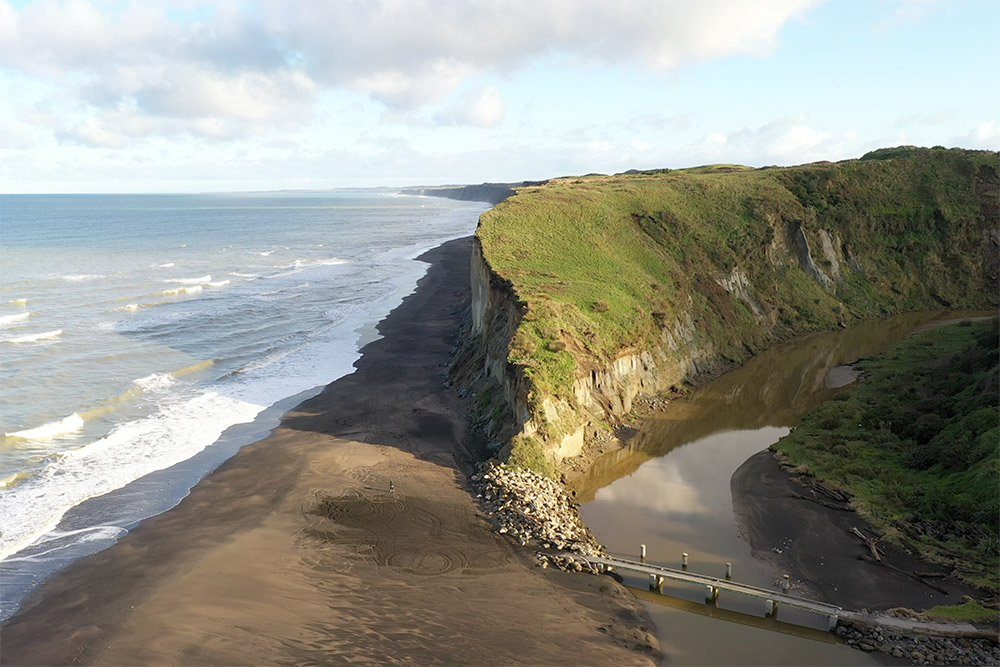Ngaa Rauru Kiitahi: The people have spoken
Chapter 5
The people have spoken
The signing took place inside Maatangireia, the old Maaori Affairs Select Committee room at Parliament.
Explore Chapter 5
Video transcript
The 23rd of November 2003 marks the signing of the Deed of Settlement.
The signing took place inside a special room at Parliament, Maatangireia.
Te Pahunga Marty Davis, Iwi Negotiator:
‘We were actually on our way to Wellington and we got to Parliament steps and we were going to the Maaori, the Treaty Room to sign, and he stopped me as we were going down the passageway.’
Mike Neho, Lead Negotiator:
‘I really didn’t think it was right..’
Te Pahunga Marty Davis, Iwi Negotiator:
‘I said, “Look, we’ve come too far, you know, we’re there”.’
Mike Neho, Lead Negotiator:
‘I saw the Crown smiling and happy, oh here’s Ngaa Rauru Kiitahi, yay, this is a good day for them.’
Te Pahunga Marty Davis, Iwi Negotiator:
‘He stopped me as we were going down the passageway, and says, “I’m not signing”.’
Mike Neho, Lead Negotiator:
‘I saw the faces of the Crown and thought, nah go to hell!’
Te Pahunga Marty Davis, Iwi Negotiator:
‘I said bluntly, “You don't have that choice. The people have spoken”, hoping that he would sign.’
Mike Neho, Lead Negotiator:
‘We were there on the day of the signing and I was feeling absolutely dejected. I was heartbroken because we didn’t achieve what we said we would.’
Te Pahunga Marty Davis, Iwi Negotiator:
‘He felt like we all did. That we were raped and pillaged in the process. It was an arduous process. There were lots of things that we should not have perhaps agreed to.’
Mike Neho, Lead Negotiator:
‘Marty kept pressing me because I was the lead negotiator, you know but I would never agree.’
Te Pahunga Marty Davis, Iwi Negotiator:
‘We were all feeling the same, but the word that we put through to our people, they went and voted on all of that and agreed. Yeah, 92 something percent of the registered people who voted, said “Yes”. I think the highest number of “No” were the invalid votes.’
Mike Neho, Lead Negotiator:
‘At the start of our journey, the three of us agreed; Marty, Bill Hamilton, and I agreed that if the claim did not equate to the amount that Ngaati Ruanui had received, then we would not agree. That was not a discussion had with the iwi, it was between us three. I saw Marty and he was happy. Bill was sort of happy. But me? I was hurting. Consequently, we signed, we signed. It ended there.’
Te Pahunga Marty Davis, Iwi Negotiator:
‘Looking at the total process, we understood it really well. It goes in this, and then it has to go through a mandate process, negotiation, deed and so on, and all of this stuff, then you have an apology section.
So we ask the question, what does that look like? We’ve seen some and frankly, empty words. So what does that look like? And they said, ‘Oh we’ll draft something up for you’, which they actually did.’
Mike Neho, Lead Negotiator:
‘I was the chair of the Iwi Authority at the time. I stood up and said to Margaret Wilson, there is no reason to celebrate this day because 125 acres have come back to us but 560 lost to plunder and confiscation, so is that a reason to be happy? So that was that.
[What did she say to you?]
‘Oh Mike but that’s a milestone.’ She said a lot of things to commend themselves. That is what they wanted. Through this, the Government, Labour at the time, could be recognised. That is what they really wanted, to be acknowledged for working together with Ngaa Rauru Kiitahi. Not a chance.’
Te Pahunga Marty Davis, Iwi Negotiator:
‘We looked at it and go, ‘Rubbish! We’re not accepting that.’
And they kept hounding us, like, you need to have this apology. We said, ‘No. Not under us, it’s not gonna happen.’
Right up until signing. The Minister was Margeret Wilson. The Minister, she was saying, ‘Are they going to do this apology? And the Office of Treaty Settlements, said, ‘No. Not happening, and this is why.’
‘No amount of words can…’. Unless you look at the quantum that we set down for you, which is $3 billion. We said look, we're really good at wanting to accept 10% of that 300 million. Got 31. So that's how big we saw that.’
Mike Neho, Lead Negotiator:
‘Once we were in agreement, we went to sign the deed. We did not agree to broadcast it to the world like iwi had done previously or those who came after. Many went to parliament and were happy. Our perspective was that there was no reason to be happy.’
The full and final settlement meant the resolution of all Ngaa Rauru Kiitahi Treaty claims filed with the Waitangi Tribunal. This included all claims relating exclusively to Nga Rauru Kiitahi and any interests vested in representative entities.
Then came the first reading of the Ngaa Rauru Kiitahi Claims Bill before the Members of Parliament.
Whilst huge support and congratulatory messages circulated the room, it was clear the work for Iwi was far from over.
Gerry Brownlee, National Party:
‘...the proposal to hand over in the settlement a number of properties, one of which is described as a beach site. We will want to find out through the select committee process how that ties in with the Foreshore and Seabed legislation’
Pita Paraone, New Zealand First:
‘...My understanding of the Foreshore and Seabed Act is that it covers only the wet part of the beach. I do not believe that it would honour the spirit in which Ngaa Rauru Kiitahi have accepted this settlement just to give them a beach they can enjoy only when the tide is out.’
Stephen Franks, ACT:
‘I am asking, as a matter of principle, that when we are debating written material with both languages, what mechanism there may be for assurance as to the accuracy of the translation.’
Metiria Turei, Green Party:
‘In negotiating settlements such as this one, claimants are routinely presented with a “take it or leave it” bottom line from the Office of Treaty Settlements, with the Government prepared to negotiate only on the minor matters.’
Gerry Brownlee, National Party:
‘...it is no good saying the settlement is full and final if anything up to 70 percent of the iwi has not voted in favour of such a settlement. It leaves open the opportunity to say that Parliament forced the settlement on the iwi, when future generations consider how well the settlement has treated them.’
Pita Paraone, New Zealand First:
‘...the principles of the Treaty of Waitangi. “I signal to this House that in supporting this bill going to a select committee, New Zealand First will vigorously seek the removal of that reference from all parts of the bill”.’
Metiria Turei, Green Party:
‘It is generally assumed that the treaty settlement process is an attempt to resolve the injustices of the past and represents a genuine effort on the part of the Government to bridge the divide between Maaori and Paakehaa, but it is not.
The Waitangi Tribunal, although it has achieved a great deal through its meticulous report writing and its ability to operate on the proverbial smell of an oily rag, is a creature of statute.’
Murray Smith, United Future:
‘My tiipuna, my great-grandparents in particular, farmed in and around Maxwell. They would have been there at the time when a lot of these grievances arose. I want personally to extend the apologies of my own whaanau and tiipuna for the events that caused such hurt and injury to the people of Ngaa Rauru Kiitahi, and to give that apology personally so that I can recognise it on behalf of my own family.’
Georgina Te Heuheu, National Party:
‘As we all know, the history that underpins this settlement bill is like the history of all the Taranaki and other tribes that suffered raupatu, particularly following military action….
It is one of total dispossession, of humiliation, of belittlement, of the loss of life of men, women, and children—sometimes in the most appalling circumstances - and of the suspension of the law so that the Crown could have its way.’
Mita Ririnui, Associate Minister for Treaty Negotiations.:
‘I join my colleague the Hon. Mark Burton in commending the individual kaumaatua members and negotiators of Ngaa Rauru Kiitahi who have demonstrated commitment, leadership, courage, and integrity in achieving a settlement of the claims of Ngaa Rauru Kiitahi. I say courage, because it is a huge responsibility for this generation of Ngaa Rauru Kiitahi to end the pursuit of their claims and accept redress that we all know is less than the total loss they suffered.
I move that the Ngaa Rauru Kiitahi Claims Settlement Bill be referred to the Maaori Affairs Committee for consideration, that the committee present its final report on or before 10 May 2005.’
News Story, Te Kāea, Whakaata Māori 2005
Hemopo, Karley (reporter), 2005, Te Kāea, Whakaata Māori, Māori Television Service:
‘Greetings one and all.
Paepae Rangatira is a unique section within the settlement between Ngaa Rauru Kiitahi and the Crown.
Ngaa Rauru Kiitahi believes wholeheartedly this is an example to progress Crown and Hapuu Iwi relations everywhere.
However, the immediate concern perhaps before them is its obligations closer to home. - Niwa Milroy, te kaiwhakataki moo Te Kaaea, Whakaata Maaori.
Five submitters sit before the Maaori Affairs Select Committee to express their concerns about the Ngaa Rauru Kiitahi Claims Settlement Bill.
No one can say, “Here is a child. This child is from Ngaa Rauru Kiitahi.”
“I am aware that the settlement is full and final.”
“I oppose this bill in its entirety.”
“Waitootara is my river. At each bend, a Paakehaa, at each bend, a Paakehaa. That is the real problem for Ngaa Rauru Kiitahi at this time.”
“Whanganui’s claims will not be impeded by Ngaa Rauru Kiitahi’s progress.”
The definition of territorial rights is the challenge put on the table by Te Ruunanga o Tuupoho. It is common knowledge shared by Ngaa Rauru Kiitahi and Te Ruunanga o Tuupoho but the concern is how that definition sits with the Crown.
“The Whanganui narrative is that its jurisdiction goes to Kai Iwi and Whangaehu. Our thoughts, and concerns, is what the Crown’s perspective is.” - John Maihi, Te Ruunanga o Tuupoho
“The ‘right foot’ knows its ‘left’, and we have discussed it together in meetings. We have established among ourselves that ‘they’ are also us.” - Mohi Apou, Ngaa Rauru Kiitahi
“And then there is the hapuu of Ngaa Ariki who want to submit their own claim WAI772, independent of Ngaa Rauru Kiitahi, so that the territorial rights of their hapuu are not taken by them but they strongly believe this has already happened.
“What is a landless people? No people. No land, no people. Because the self-determination and the strength of the people lies within the hapuu but the land will never return to the hapuu. A small amount of land may come back to this thing, the governance entity, but what is that?” - Pootonga Neilson, Ngaa Ariki
The bill was eventually read a third time before the House.
The Deed of Settlement signed by Ngaa Rauru Kiitahi and the Crown in 2003, became law in 2005.
Almost 20 years on, Whanganui iwi is now set to head into their own land settlement negotiations.
And those Ngaa Rauru Kiitahi hapuu with outstanding interests south of the Kai Iwi stream, are preparing for their claims to be heard too.
Raukura Naani Waitai, Ngaati Pukeko, Ngaati Iti:
‘With the Ngaa Rauru Kiitahi settlement, just got to understand that at that time, Ngaa Rauru Kiitahi was really keen to get on with things and go through Treaty settlement. But at that time Whanganui Iwi were still focussed on settling Te Awa Tupua, so they were in no position whatsoever to even start thinking about land claims, so we were in that context. One iwi wants to settle, the other iwi was nowhere near ready. And it just so happens that our hapuu, of Tamareheroto, etc., we’re located in that crossover area.
Our hapuu down the southern end of Ngaa Rauru Kiitahi is Ngaati Tamareheroto, Ngaati Iti, Ngaati Pukeko. We have Ngaati Kauika in Castlecliff and our older people Ngaa Aruhe. We go from Te Kaihau a-Kupe at the river mouth, the Whanganui River mouth and coastal-inland wise, we go to the Ookehu Stream. We follow the Ookehu Stream inland. We also follow the watershed on the Whanganui side, so our hapuu rohe is within that area. And coast-inland wise, the Ngaati Pourua, Ngaati Taahau hapuu estate. We’ve got bones in this land, we’ve got waahi tapuu, waahi tuupuna. Goes right to Te Kaihau a-Kupe.
There were gentlemen agreements made in those decades that leadership, high level leadership, were aware of, but hapuu weren’t necessarily aware of, that hapuu didn’t even necessarily agree to.
The agreement was, well, Ngaa Rauru Kiitahi will look after any Whanganui interest north of the Kai Iwi Stream, Whanganui would do the same for Ngaa Rauru Kiitahi south of the Kai Iwi Stream.
What I understood though was that there would come a time after settlement, after Ngaa Rauru Kiitahi Settlement, at a time when Whanganui Iwi was ready, that remaining part of us would be addressed.
In a way, it’s felt – the more we sort of talk about this issue, the more it feels like we’ve been left out. We’ve been quite left out of the Ngaa Rauru Kiitahi Settlement. And really been forced to wedge our way into the Whanganui Land Settlement, which hasn’t always been easy.
It’s a constant journey of relationship building and trying to be involved, be included with wider hapuu of Whanganui that believe that Ngaa Rauru Kiitahi have settled, and so why are we involved in this space, in the Whanganui Land Settlement space.
And challenging that, that we’re perhaps double dipping, which isn’t the situation at all. Anyone that knows the Ngaa Rauru Kiitahi Settlement knows that there was no land returned to our hapuu this side of the Kai Iwi Stream.
The thing I do love about the Whanganui Land Settlement approach to Treaty negotiations is that they are really all about empowering hapuu. And they’re under no misapprehension that Tamareheroto, Ngaati Kauiki belong to Ngaa Rauru Kiitahi and Whanganui whakapapa. So that’s great. And that’s what Te Kaahui o Rauru is doing for us as well. They are empowering us as hapuu to say what the direction will be and what ways can they help, and they do.
The other benefit with being involved in the Whanganui Land Settlement is that there’s a focus on getting land back. It’s a land settlement, so land needs to come back. Whenua is a big issue for us, so that’s why we’re so excited to be involved - excited, but apprehensive about being involved with the Whanganui land settlement because now we have an opportunity that just wasn’t open to us before.
Happy about the opportunity but worried that in the future our uri might look at this involvement of our hapuu within the Whanganui Land Settlement as somehow, our way of saying we don’t want to belong to Ngaa Rauru Kiitahi anymore, which is absolutely not true. That really saddens me that that perception may eventuate or may be out there because it’s so untrue.
And I think that if people understood, that on a hapuu level, we’ve had to fight to have our issues from Kai Iwi to Te Kaihau a-Kupe heard by the Crown and recognised somehow and compensated somehow, that they would understand, perhaps, why we’re involved.
Our hapuu, we belong to Rauru. We belong to Rua Tipua. We belong to Paerangi one and two, and Paerangi and Rua Tipua are the rootstock tuupuna for Whanganui iwi. So we have a right to be involved in this settlement.
I’m really hoping that Ngaa Rauru Kiitahi holds fast with their southern boundary, as being Te Kaihau a-Kupe. And I also hope that Whanganui holds fast to wherever they say their boundary is and that they both recognise us as being the hapuu within that area.’
We got to Parliament steps and we were going to the Treaty room to sign. He stopped me as we were going down the passageway and he said, ‘I’m not signing’.
I said bluntly, ‘You don't have that choice, the people have spoken’.
- Te Pahunga Marty Davis, Lead Iwi Negotiator
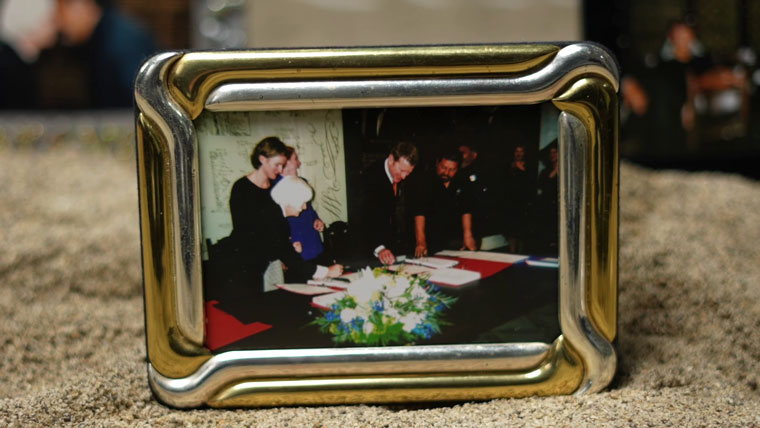
I really didn’t think it was right. I saw the Crown smiling and happy. There we were on the day of the signing, and I was feeling dejected. I was heartbroken because we didn’t achieve what we said we would.
- Mike Neho, Iwi Negotiator
He felt like we all did. That we were raped and pillaged in the process. It was an arduous process and there were lots of things that we should not have perhaps agreed to. 92% of the registered people who voted said, ‘Yes’.
- Te Pahunga Marty Davis, Lead Iwi Negotiator
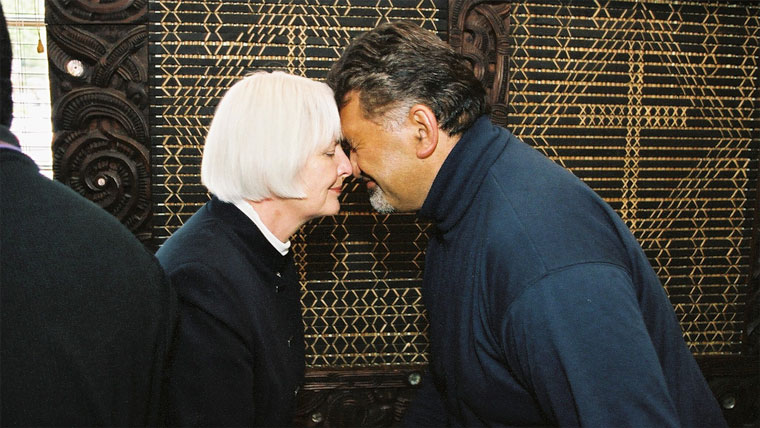
The full and final settlement meant the resolution of all Ngaa Rauru Kiitahi Treaty claims filed with the Waitangi Tribunal.
This included all claims relating exclusively to Nga Rauru Kiitahi and any interests vested in representative entities.
Then came the first reading of the Deed of Settlement Bill before the Members of Parliament.
Whilst huge support and congratulatory messages circulated the room, it was clear the work for Iwi was far from over.
...the proposal to hand over in the settlement a number of properties, one of which is described as a beach site. We will want to find out through the select committee process how that ties in with the Foreshore and Seabed legislation.
- Gerry Brownlee, National Party
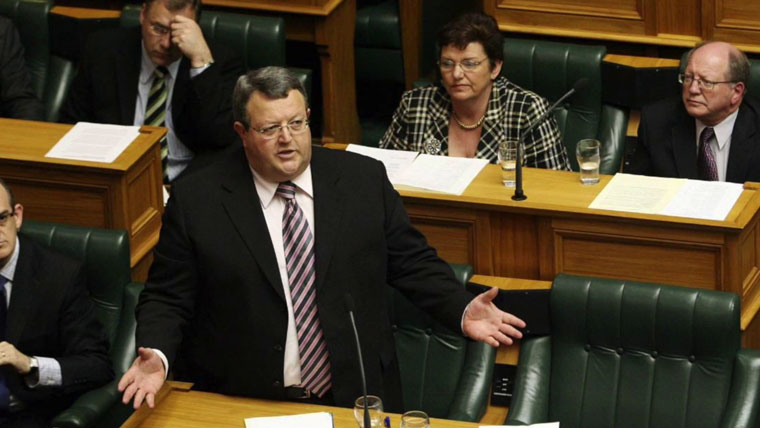
My understanding of the Foreshore and Seabed Act is that it covers only the wet part of the beach. I do not believe that it would honour the spirit in which Ngaa Rauru Kiitahi have accepted this settlement just to give them a beach they can enjoy only when the tide is out.
- Pita Paraone, NZ First
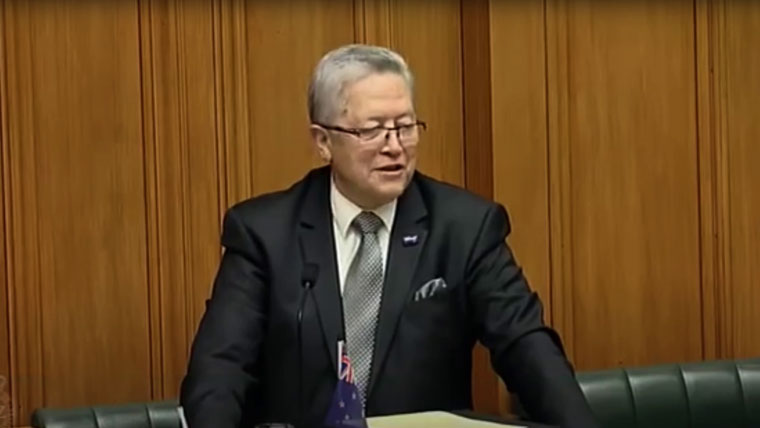
I am asking, as a matter of principle, that when we are debating written material with both languages, what mechanism there may be for assurance as to the accuracy of the translation.
- Stephen Franks, ACT Party

In negotiating settlements such as this one, claimants are routinely presented with a ‘take it or leave it’ bottom line from the Office of Treaty Settlements, with the Government prepared to negotiate only on the minor matters.
- Metiria Turei, Green Party
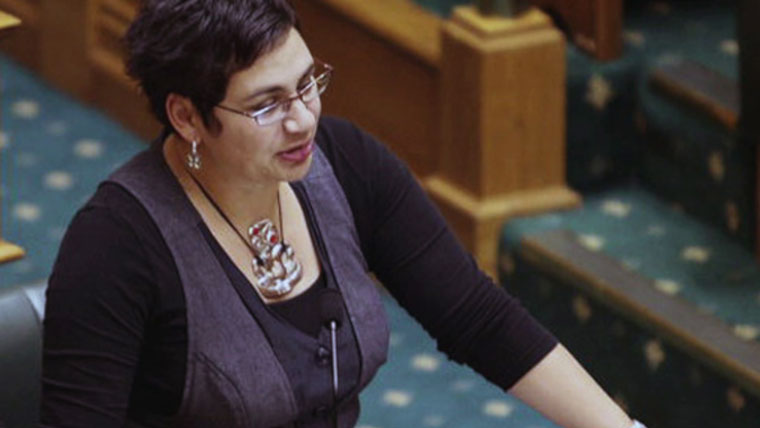
...the history that underpins this settlement bill …is one of total dispossession, of humiliation, of belittlement, of the loss of life of men, women, and children—sometimes in the most appalling circumstances - and of the suspension of the law so that the Crown could have its way.
- Georgina Te Heuheu, National Party
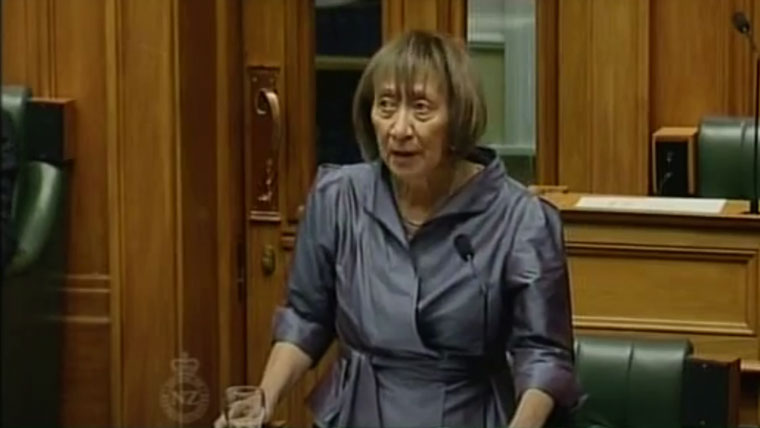
My tiipuna, my great-grandparents in particular, farmed in and around Maxwell. They would have been there at the time when a lot of these grievances arose. I want personally to extend the apologies of my own whaanau and tiipuna for the events that caused such hurt and injury to the people of Ngaa Rauru Kiitahi…
- Murray Smith, United Future

I join my colleague the Hon. Mark Burton in commending the individual kaumaatua members and negotiators of Ngaa Rauru Kiitahi who have demonstrated commitment, leadership, courage, and integrity in achieving a settlement of the claims of Ngaa Rauru Kiitahi.
I say courage, because it is a huge responsibility for this generation of Ngaa Rauru Kiitahi to end the pursuit of their claims and accept redress that we all know is less than the total loss they suffered.
- Mita Ririnui, Labour Party
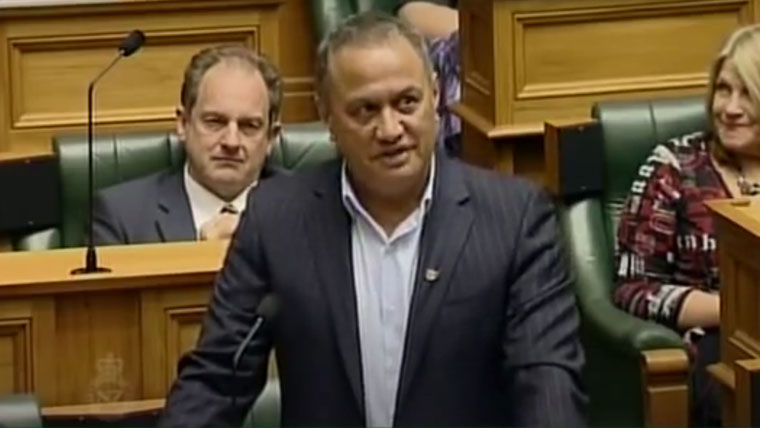
The bill was eventually read a third time before the House.
The Deed of Settlement signed by Ngaa Rauru Kiitahi and the Crown in 2003, became law in 2005.
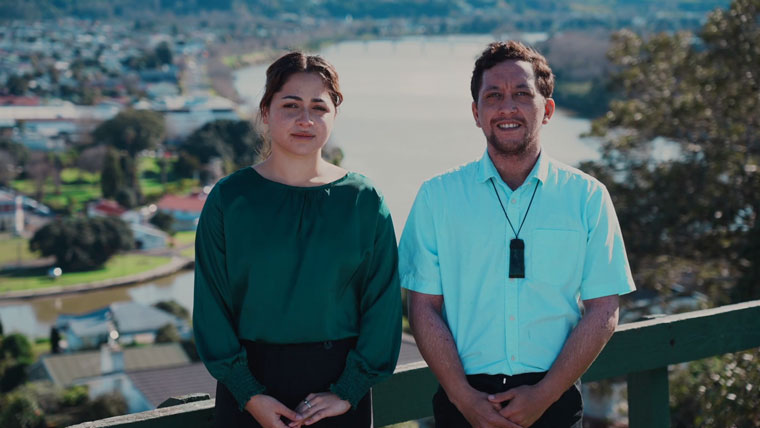
Almost 20 years on, neighbouring Whanganui Iwi is now set to head into their own land settlement negotiations.
And those Ngaa Rauru Kiitahi hapuu with outstanding interests south of the Kai Iwi stream, are preparing for their claims to be heard too.
Notes and credits
Main image: The Debating Chambers, Parliament.

